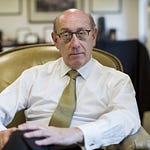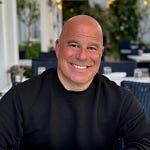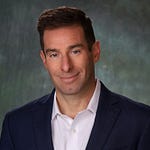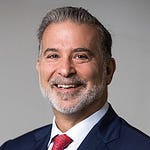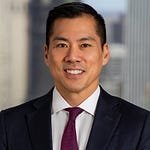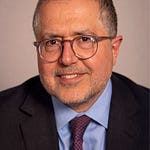Who is the nation’s top Supreme Court advocate?
If you were to poll the SCOTUS bar, many members would name Paul Clement. The 43rd Solicitor General of the United States and a veteran of over 100 arguments before the Court, he has argued more Supreme Court cases since 2000 than any lawyer in or out of government. Former Acting Solicitor General Neal Katyal described him as “the preeminent advocate in his generation,” while SCOTUSblog founder Tom Goldstein dubbed him “a god.”

And Paul Clement, 56, has been having quite the year. He won two of the biggest cases of the last Term: New York State Rifle & Pistol Association v. Bruen, the landmark Second Amendment case, and Kennedy v. Bremerton School District, the case of the praying football coach. Despite his win in Bruen, his law firm at the time, Kirkland & Ellis, announced that it would be withdrawing from all Second Amendment cases—on the day that Bruen was handed down. So Paul and his longtime colleague Erin Murphy withdrew from Kirkland, leaving to launch Clement & Murphy, their own appellate and Supreme Court boutique.
After I had a top trial lawyer, Alex Spiro of Quinn Emanuel, as my first podcast guest, it seemed like a logical next step to welcome a leading appellate advocate as my next guest—especially since the episode would air during the first week of October, the start of the new Supreme Court Term. I invited Paul to join me, and I was delighted when he agreed.
In our conversation, we discussed a wide range of topics, including his high school and college debate career, his advice for appellate advocates, some additional backstory behind his departure from Kirkland, his concern about Biglaw’s increasing unwillingness to take on controversial cases and clients, and the time he may or may not have attended a Green Day concert with Elena Kagan. You can check out the episode by clicking on the embed at the top of this post.
Show Notes:
Paul Clement bio, Clement & Murphy PLLC
The Law Firm That Got Tired of Winning, by Paul Clement and Erin Murphy for the Wall Street Journal
You Won Your Gun Case. You’re Fired, by the Wall Street Journal Editorial Board
The Legal Wunderkind Challenging The Health Law, by Nina Totenberg for All Things Considered/NPR
The Paul Clement Court, by Jason Zengerle for New York Magazine
Prefer reading to listening? A transcript of the entire episode appears below.
This transcript has been cleaned up from the audio in ways that don’t alter meaning—e.g., by deleting verbal filler or adding a word here or there to clarify meaning.
David Lat: Hello, and welcome to the Original Jurisdiction podcast. I’m your host David Lat, author of a Substack newsletter about law and the legal profession also named Original Jurisdiction, which you can read and subscribe to by going to davidlat.substack.com.
You’re listening to the second episode of this podcast, which I aim to air every other Wednesday. In the first episode, I interviewed Alex Spiro, one of the nation’s top trial lawyers. For this episode, which I knew would air during the first week of the new Supreme Court term, I decided to interview one of the nation’s top appellate advocates: Paul Clement, the 43rd Solicitor General of the United States and now name partner at the Clement & Murphy boutique.
Paul has argued more than 100 cases before the U.S. Supreme Court, more cases since the year 2000 than any other lawyer, and they’re basically a “greatest hits” of SCOTUS. He scored two of the biggest wins from the last Term, namely, New York State Rifle and Pistol Association v. Bruen, the landmark Second Amendment case, and Kennedy v. Bremerton School District, the case of the praying football coach.
Paul graduated summa cum laude from Georgetown and magna cum laude from Harvard Law School. He then clerked on the D.C. Circuit for Judge Laurence Silberman and on the Supreme Court for Justice Antonin Scalia.
After spending the early years of his career working in Biglaw and on Capitol Hill, Paul joined the U.S. Solicitor General’s Office in 2001, then became the Solicitor General in 2004. After stepping down as SG in 2008, he joined the D.C. office of King & Spalding, but left in 2011 after the firm basically changed its mind about letting him represent the House of Representatives in defending the Defense of Marriage Act. He joined Bancroft, an elite boutique founded by his HLS classmate Viet Dinh, and when Bancroft got absorbed by Kirkland & Ellis in 2016, Paul became a partner at Kirkland, one of the most prestigious and profitable law firms in the world.
But earlier this year, after Paul won Bruen, the big Second Amendment case, Kirkland announced it would no longer handle gun-rights cases. Unwilling to abandon his clients in the space, Paul and fellow Kirkland partner Erin Murphy left to launch their own appellate and Supreme Court boutique, Clement & Murphy. The firm has been in business for about three months and already has almost a dozen lawyers.
In our conversation, Paul and I talked about a wide range of topics, including his high school and college debate career, his advice for appellate advocates, some additional backstory behind his departure from Kirkland, his concern about Biglaw’s increasing unwillingness to take on controversial cases and clients, and that time he may or may not have attended a Green Day concert with Elena Kagan.
Without further ado, here’s my interview of Paul Clement.
DL: So where are you calling in from, Paul?
Paul Clement: I’m calling in from my home office in Alexandria, Virginia.
DL: Great. And are those bobbleheads I see to my left?
PC: Those are bobbleheads, yes. That is only part of my collection, but those are bobbleheads.
DL: Do you have all nine of the current justices? Oh, I don’t know if there's one for Justice Jackson yet.
PC: Yes, it’s just hard, the Green Bag doesn’t help me out with new bobbleheads until the justices have been on the Court for a while. But this is a very eclectic collection that includes Aaron Rodgers and James Madison. So it’s not just the justices.
DL: Excellent. So again, I’m really grateful to you for joining me. Maybe we can start at the beginning. You grew up in Cedarburg, Wisconsin, the youngest of four. How would you describe your childhood?
PC: It was very Midwestern, very Wisconsin. I grew up rooting for the Packers and going to public schools, which were about the only schools available in a small town in Wisconsin, and it was a great place to grow up—a little cold, which is part of the reason I moved, but a great place to grow up.
DL: Your dad, I believe, was a CFO, and your mom was a stay-at-home parent who did a lot of volunteer work?
PC: You're very well informed. That's right.
DL: And what about your older siblings?
PC: My older siblings include one lawyer, one sort of self-employed kind of house painter, probably for lack of a more accurate description, and my sister was an accountant for a long time as well.
DL: In your childhood, was there any hint that you would go on to become such a high-powered lawyer and Supreme Court advocate?
PC: Probably not, but I think, as you said, I’m the youngest of four children, and my oldest brother went to law school when I was nine years old or something like that. As a result, the possibility of going to law school or becoming a lawyer was pretty prominent from an early age. And then when I got to high school, I got very interested in debate and extemporaneous speaking and things like that. So by that point, the possibility of going to law school started to loom pretty large.
DL: As a former high school and college debate person myself, I did notice that in your background. It sounds like you were quite active in both high school and on the parliamentary circuit in college?
PC: Yes, more so in high school than college, but I did do parliamentary debate as well. Georgetown wasn’t one of those programs that was going to APDA [American Parliamentary Debate Association] tournaments every weekend or anything like that, but we would go to three or four tournaments a year, which was great. But high school was definitely something where virtually every week we were either going to a debate in the fall season or extemporaneous speaking tournaments in the spring season. So that was a big deal.
DL: Did you do both Lincoln-Douglas debate and extemp? What were your events?
PC: Really more extemp and policy, though I did do Lincoln-Douglas from time to time. But for whatever reason, in Wisconsin when I was growing up, there were regular policy debate tournaments, but not regular Lincoln-Douglas tournaments.
DL: Fair enough. It’s always striking to me how many top lawyers actually have debate in their background. It's a great program.
PC: It’s a great program, and I had three boys who all did Lincoln-Douglas debate. I’m a big believer in it, and I think it’s more important than ever. People are starting to forget how to disagree agreeably and are starting to take this view that there’s only one side to some debates. Having students have to debate position A in the morning and then position not A in the afternoon is just a great discipline for people, whether or not they become lawyers.
DL: Absolutely. I could not agree more.
Turning to your work today as an advocate, let me just cut to the chase: what would you say makes you different? There’s an elite Supreme Court bar featuring other people who are brilliant and hardworking. What’s the Paul Clement special sauce?
PC: I don’t know that there is one, but one of the things that I’ve always really focused on is trying to be very conversational in the argument. It’s something where you’re having a conversation with, on the court of appeals, typically three, and in the Supreme Court, typically nine, generalist federal judges. So you’re not going to persuade them by being overly rhetorical. You’re not going to persuade them by being so hyper-technical that a generalist isn’t going to appreciate the point that you’re making. And so I’ve always tried to make the argument in a way that is zealous and persuasive hopefully, but conversational.
DL: I’ve definitely noticed that in listening to your arguments. You have very folksy phrases like “the game’s not worth the candle” or “music to my ears”—things that a normal person listening to a Supreme Court argument could actually follow. It’s not all jargon.
PC: That’s super important. Not because you’re expecting the argument to be relayed to people outside the courtroom, but because that’s the way that the justices relate to arguments as well. When you’re in the courts of appeals, that’s the way appellate judges generally respond to these arguments.
One thing that certainly doesn’t work with the Supreme Court is to go up there and try to say, ‘Oh, I’m a specialist and I know more about this area than you do.’ I think decades ago, when you had a super-complicated tax case in the Supreme Court, you’d go find the preeminent tax practitioner to argue the case in the Supreme Court. I don’t think that’s any longer the case, and I think that’s probably in the client’s best interest because the justices will figure out the right answer in the case, but they’ll figure out the right answer in the case as generalists. They also will approach it probably more as a statutory-construction issue than a so-called tax issue. And you can apply that to almost any area of the law now where I think that having specialized Supreme Court counsel that’s really more focused on how to be persuasive to the nine justices is the right way to approach it, as opposed to thinking about things through the lens of just the substantive specialty.
DL: That definitely does seem to be the dominant view or the strong trend. I totally agree with you.
Turning to tips about appellate advocacy, there are a lot of them out there. For example, don't speechify, listen very carefully to the judges’ questions. Is there something in the conventional wisdom of appellate litigators that you disagree with or that you don’t follow as a practice?
PC: I’m not sure if there’s anything obvious that I just absolutely disagree with. It’s more just in maybe degrees of emphasis or the like. I’m a real big believer that you have to answer the judges’ questions. I’ve heard some lawyers talk about the idea that there are some questions that you really can’t answer, so you’ve got to kind of foul them off like the batter in the batter’s box, and I just don’t think that works. You really have to continue to refine your case until you can answer every question as effectively as you can.
But again, I don’t know if there’s one piece of conventional wisdom that I think is just dead wrong or anything. I really do think that answering the questions to the best of your ability is critical. I also think, particularly in the Supreme Court, one of the things that I’m just not sure the conventional wisdom addresses one way or another, is always how important it is to recognize that your audience isn’t limited to the justice that just asked you the question. You really are answering that justice’s question, but you’re trying to be persuasive to the whole court, and that’s an important lesson because sometimes you can get too tied up in the exchange with one justice who may already agree with you or may already fundamentally disagree with you, and you don't want to do that and lose sight of the fact that the way you win your cases is to get five justices, not to super-persuade one.
DL: Let me ask you this then. You’re an amazing appellate advocate, oral advocate, but the cases that go to the Supreme Court often are about very controversial issues that the justices may have strong views on. This is a very open-ended question, so you can answer however you like, but how much of a difference do you think oral argument makes?
PC: I tend to think it makes a big difference, but I would almost have to say that—otherwise I’ve wasted so many weekends of my life! It would really be discouraging to find out that, after all, it made no difference whatsoever. Now, maybe it makes more of a difference in an ERISA case or a bankruptcy case, where the justices don’t walk in with any particular preconception. And certainly there are some cases where the equation is so overdetermined by what the justices think, or the case is not really that close at the end of the day, that the oral argument’s not going to make any difference.
But I do think—maybe because I have to think—that in a lot of cases the oral argument does make a big difference. Maybe not because there’s that one eureka moment where it all just turns around, but in most cases there are a handful of questions that are bothering the justices or the judges on both sides of the case. And if you can persuasively deal with those handful of questions, and show that the parade of horribles isn’t that horrible, or whatever it is, and the other side is less comforting to the justices about the handful of things that bother the justices about their side of the case, that can often make all the difference.
DL: And I think sometimes—and I’ve noticed this—sometimes advocates might say things at argument that will affect how the opinion gets written. Maybe a concession, maybe bringing up something from the record that was overlooked. So I do think that is probably something also in the mix.
PC: Sure. And it’s also probably much easier to lose a case at oral argument than to win. And I do think sometimes you’re exactly right and really, even if you don’t influence the ultimate outcome in the case, you as the oral advocate can have a huge impact on how the opinion is written. Or can make, as you say, a concession that makes a case that could be really difficult into a somewhat easier case for the court. And I think the court would welcome that, and that directly impacts how the opinion is written.
DL: In terms of cases that probably were going to go the way they were going to go [regardless of the oral argument], obviously I think of the first Affordable Care Act case, which you argued. You’ve had some amazing wins, and you’ve also had some prominent losses. Over the course of your career—and you’ve argued by now more than 100 cases before the Supreme Court—is there a particular win that you are most proud of?
PC: I’m not even sure I could identify one that I’m most proud of. Honestly, for Supreme Court arguments, you spend so much time with the case that by the end of it, Supreme Court arguments are a little like children: you love them all. You feel very good about all the wins, and the losses still stick in your craw even years later.
So it’s hard to pick just one. But there are certainly cases where you feel like, wow, the advocacy really may have made a difference. I argued a case a couple years ago about the interaction between eminent domain law and state sovereignty, so-called Eleventh Amendment immunity, and all the rest. My clients prevailed in that case by a five-four majority, a very unusual five-four majority. I wouldn’t say, ‘Oh, that’s the win that I’m most proud of,’ but I love the fact that we could put together a coalition of the Court that was not anybody’s usual five-to-four, and we could appeal to different justices with different arguments. That was also a case where one of the arguments I was able to make was an analogy to United States v. Texas—a wonderful, old, late-nineteenth-century chestnut that was not in the briefs, but I thought it was a very helpful analogy so I worked it into the oral argument—and it ended up featuring in the Court’s opinion. So things like that, I’m happy about that.
Other cases maybe you appreciate for different reasons. I’ve always felt very positive about what the Office of the Solicitor General and my own role in it were able to do for the Court in the McConnell v. FEC case, about the constitutionality of the Bipartisan Campaign Reform Act or the McCain-Feingold Act. That was a case where a lot of Republicans were rooting against the Bush Justice Department, so the case is memorable because of that.
But what really sticks out in my mind is the fact that this was one of these cases where Congress created a mechanism for lots of people to challenge the statute right away in district court, so there were maybe 11 different challenges brought to the constitutionality of the law. There was a three-judge district court convened. They wrote something like a 1,500-page opinion—actually, three judges wrote four opinions. So the whole thing was an unwieldy mess, and there was a direct appeal to the Supreme Court.
What we were able to do in the SG’s Office was to file a single brief. It was the longest brief I’ve ever had my name on, but it was still only 135 pages, and it was just one brief responding to 11 different briefs on the other side. And I always felt like we were able to make that case manageable for the Supreme Court, which was, I think, really consistent with the traditions of the Office and something that I’ve always felt like, that’s a case where we made a difference—putting aside the outcome, which worked out alright for the Office in the main, but we also made a difference in just taking a very unwieldy case and making it manageable for the Court.
DL: The other thing I would note about that case is that you were arguing for a side that maybe some conservatives or Republicans might not like. I think a lot of times people view you as a Supreme Court advocate for conservative causes, but you’ve represented criminal defendants, you’ve represented immigrants, and you tried to defend this campaign finance law, and many conservatives are very averse to campaign finance regulation.
PC: Yeah, and that’s something that goes back to working in the Solicitor General’s Office. Obviously there are a couple of prominent examples [to the contrary] every couple of years, but for the most part, the Solicitor General’s Office and the Justice Department more generally really pride themselves on defending the constitutionality of statutes, whether or not the party in power at the time loves the statute or hates the statute. And that’s something that is very much bred into you in the SG’s Office, and you feel very strongly that it’s important in a case like the Bipartisan Campaign Reform Act or even other cases involving….
Most conservatives like the Eleventh Amendment immunity for states. But in the SG’s Office, you’re defending the prerogative of the federal government and the Congress to impose damages liability on the states. So in a bunch of those cases, you’re on the anti-federalist side of things, but that’s all consistent with the best traditions of the Office. And then when you leave the SG’s Office, I think myself and a lot of people feel, you take that with you.
So maybe your opportunities come more on cases that people identify as conservative or for other people liberal, but I’ve always really enjoyed being able to take cases that don’t necessarily fit that pattern. You’ve mentioned a bunch of them, but if you look at even sub-issues, I’ve had cases where I was aligned with the Native American tribes and represented Native American tribes, and I’ve had cases where I’m on the other side, and I just feel, in a sense, you’re a better advocate if you’re willing and able to take cases with differing perspectives.
When I was at Bancroft, a smaller firm, I was able to do some plaintiff-side work that you can’t really do in big law. I’ve always thought that doing some of that plaintiff-side work made me a much better defense-side lawyer. When I got the chance to do it on the other side, I got to see things differently. You get a more holistic approach to the law, and you understand what makes the other side tick.
DL: That makes perfect sense. So you mentioned Bancroft, which is the boutique that you were at after you departed from King & Spalding. And now, of course, as has been covered extensively, you and Erin Murphy, about almost three months ago to the day today, left Kirkland & Ellis to launch Clement & Murphy.
So what is your vision for the new firm? You’re already up to almost a dozen lawyers, and you’ve only been around for three months. How big do you want the firm to get? Are you going to expand beyond appellate work? What is your vision for the firm?
PC: The vision in the short term is to be an appellate boutique and a sort of Bancroft 2.0—with apologies to [Bancroft founder] Viet [Dinh], who is elsewhere occupied at the moment, but… I don't think, at least right now, I don’t envision the firm getting particularly large or getting involved in issues that are far removed from appellate practice.
There may be some practices that are very closely allied where if the right lawyer wanted to join us, certainly we’d be open to that. I've always thought like what we did at Bancroft and hope to do at Clement & Murphy is to apply our appellate skillset. But that doesn’t mean that we don’t sometimes appear in district court, or sometimes do a white paper to make the case that a proposed piece of legislation is unconstitutional, or something like that.
I think it’s not so much that your work is defined exclusively by being in one set of courts versus the other. It's a skillset. Are you more of an appellate generalist, or are you more of a fact-developing, great trial lawyer? There are lots of great trial lawyers in the world. We don’t really aspire to duplicate what they do. But I do think we bring a different set of skills.
We’re up to about a dozen lawyers now, but it’s in some respects a little misleading because we haven’t actually had anybody join us who wasn’t part of our appellate practice at Kirkland. At this point it's been mostly about reassembling the band in a new place, and it's been exciting. I think Erin and I are both really excited about some of the younger lawyers that have been willing to join us. Erin and I have both left big law once before, so we know that there is life after big law—in some respects, even better life, more enjoyable in some respects on a day-to-day basis. So it's easier for us, but for some of the younger lawyers who are closer to law school and clerkships, I think leaving big law probably seems like a more daunting step. And so we’ve been really encouraged that they’ve been willing to take the leap and join us.
DL: This next question is maybe a compound question, but are you concerned about what seems to be the increasing trend of large law firms shying away from controversial clients or causes, and if so, are boutiques really the wave of the future when it comes to working on these really interesting, cutting-edge, but controversial cases?
PC: So it is a compound question. I think my answers are “absolutely” and “probably.”
On the “absolutely” part, yeah, I’m terribly concerned that it seems like it’s getting to be more and more the case that big law firms are only willing to tackle a subset of the controversial issues or on more and more issues are only willing to weigh in on one side of the “v.” And I think that’s a really troubling trend. Obviously it impacted me and Erin personally recently. I won’t speak for her, but I wasn’t particularly looking to leave Kirkland & Ellis this summer. But some things are more important than what law firm you’re at, including your commitment to ongoing representations of existing clients.
So in the end, it was an easy choice to leave, but it wasn’t like I was planning on doing that. Boutique law was thrust upon me as opposed to something that I affirmatively chose.
And I think that's a really problematic trend. I think it’s bad for the courts. I think it’s bad for the law. Big law firms can provide resources on pro bono issues. Big law firms have the resources to do certain kind of cases better than almost anybody else. And so if big law is only willing to do a subset of cases or only really be on one side of important legal issues, the whole system and the courts, frankly, are going to ultimately suffer as a result.
I’m a huge believer in the adversarial system, and the adversarial system is premised on the idea that both sides are supposed to be exceptionally well represented, even though in the end only one side is right, and you lose that if big law is going to pick one side of issues before the litigation even starts. So I think it’s absolutely a huge problem. I think it’s getting much worse, and I really hope that it will be reversed.
If not, and this gets to the “probably,” then I do think boutiques are going to be the wave of the future. But as I was alluding to, boutiques are pretty good at certain things—I like to think that we did appellate litigation as well at Bancroft as you could do at a big firm, and we hope to do the same at Clement & Murphy—but I think it’s harder for the boutique law firms to do some of the really intensive trial work that requires huge commitments of capital and labor to get it right. It’s much easier for big law to do that. I think for boutiques, the economics make it a little harder to do pro bono that involves large commitments of time and resource. Sure, you can do an amicus brief pro bono, or even an appeal pro bono, but again, some of the more time- and labor-intensive stuff, just the economics of the boutique make it pretty hard to do that.
So although boutiques may be the wave of the future, they’re not a perfect substitute. And that’s why I do think it’s really lamentable that there seems to be this trend that more and more of the controversial cases are off limits at big law firms.
DL: I totally agree with you, and I know other lawyers feel the same way in terms of just the resources that large firms can bring to the table. I would refer people to the excellent Wall Street Journal op-ed that you and Eric co-authored when you left Kirkland, if they’re looking for another articulation of the principles you just described
I am curious—and this is a little in the weeds—but did you have a sense before Bruen came down that maybe that [Kirkland’s withdrawal from gun cases] was going to happen though, because everything came together so quickly and beautifully? I have to say, your firm website, the op-ed—everything just fell into place. Did you have a hint that maybe Kirkland was going to decide not to take Second Amendment clients, including pulling the rug out from under existing clients?
PC: Yeah, look, that all didn’t happen in 24 hours or in one day, and it was a process that unfolded over a couple of weeks. So it wasn't like there wasn’t some warning of that. But I have to say, I kept thinking that of course people would, in my view, come to their senses. I feel pretty strongly that the firm made a mistake. And I guess I felt that so strongly that maybe I was blind to the fact that they really were going to go through with it, because it just seemed to me… this was something that was discussed, this client in particular was specifically discussed, when I came to Kirkland & Ellis, five years earlier from Bancroft. It’s not like the NRA only became controversial in the last three months or something. And we were representing clients in the Second Amendment space and the NRA for over five years at Kirkland. And Kirkland cashed a lot of checks from the NRA during that time period. So it really did strike me—incorrectly, as it turned out—that the firm would have realized that winning a Supreme Court case is an odd juncture to decide that you’re going to exit a particular area of the law. But in the end that’s the judgment that the firm made.
DL: You mentioned, of course, Bruen, and you also won another landmark Second Amendment case, McDonald v Chicago. You’ve just talked about the need for lawyers to represent sides that maybe they don't necessarily agree with or causes that they aren't necessarily personally aligned with. But do you happen to be a hunter?
PC: I’m actually not. I’ve very recently purchased my first firearms, which were a couple of shotguns, but I’m not somebody who comes from a hunting background. It’s funny, the year I clerked for Justice Scalia was the year he started hunting. Because he grew up in New York, he did not grow up hunting elk on the Great Plains. It was something he came to late in life.
I feel very privileged to have gotten to be involved in some of these Second Amendment disputes because as a lawyer, it is such a fascinating area of the law. If you can strip out your views about guns and firearms regulation and all that for a second, and just think about it as a legal issue, the idea that there’s this provision in the Bill of Rights that was largely unexplored by the Supreme Court for decades and decades, and then the Court takes a fresh look at it and then has to decide, okay, we recognize there’s an individual right here—are we going to apply all this baggage from the First Amendment or other areas of the law, where we have different levels of scrutiny and tests upon tests? Or are we going to come up with a very different approach because we can, because it’s a fresh area of the law?
The fact is that with the Second Amendment—you really see this both in Justice Scalia’s and Justice Stevens’s opinions in Heller—everybody has to be an originalist because there’s no good choice, right? In the Fourth Amendment or the First Amendment, you don't have to be an originalist if you don’t want to because you have ten decades of court cases to debate about, but you don’t have that in the Second Amendment. So it’s such a rich and fascinating area of the law. I feel very privileged to have gotten to litigate a number of those cases, but that’s really how I come at the area of the law, as opposed to somebody who comes at the area of the law with very strong views because I’ve been carrying a firearm since I was a wee lad or something. Really the only area of the law that I come at with that kind of intense passion is, I feel very privileged to have also gotten to represent the NFL, and that’s just entirely because I’m a football fan.
DL: That leads me to what was actually going to be my next question: what does Paul Clement do when he’s not working on Supreme Court cases? One person I talked to in preparation for this interview said it’s basically two things, football and family—and on the football score, the Green Bay Packers, I believe. Is that accurate?
PC: There are things beyond football and family, but that’s an excellent place to start. And the Packers are my NFL team of choice and that really goes back to growing up in Wisconsin. Other places like their football teams, but in Wisconsin, the Packers are the civic religion of the whole state, or at least the parts that don’t border on Minnesota. There’s some odd sort of Vikings fans in places like Eau Claire. But I grew up in the Milwaukee suburbs, where it’s wall to wall Packer fans, and I do love the team and watching the team.
And obviously family’s incredibly important. My wife Alexandra and I have three boys and I’ve spent a lot of weekends getting ready for Supreme Court arguments, but I think that’s probably made me even more conscious that, on the weekends I’m not preparing for Supreme Court arguments, it’s really important to spend time with family. Your kids—the only people who grow up faster than your own kids are other people’s kids.
Being a parent is really hard work, as you know, and when you’re doing it, it seems very tiring and tasking, but it goes by remarkably fast. And so you really do have to treasure that time and those opportunities, and no matter how excited you are about the next case you’re arguing, you can’t lose that sense of perspective.
DL: I totally agree, totally agree. Are any of your sons going to become lawyers perhaps, or are lawyers already?
PC: Time will tell. Time will tell. There’s at least one who’s thinking pretty hard about applying for law school in a year or two. So we’ll see. And I suppose I’m happy about that. I just want them to do whatever they want, but I do think the fact that at least one of them is thinking about becoming a lawyer is probably a reflection of how they saw what I did for a living and thought that might not be a bad way to spend their times professionally. So I take some pride in that.
DL: Before I go to my final four questions, which are standard for all guests, one last question about things that one does outside of work. I read in a [New York Magazine] profile that you once went to a Green Day concert with Elena Kagan. Is that true?
PC: We certainly went to… there was a Green Day concert, and I had dinner with Elena beforehand. I can’t speak to whether she went to the concert or not. I know I did. But I definitely broke bread with Elena beforehand. And I’d certainly go to a Green Day concert with her again—she’s a great justice, but she’s also a friend. And my taste in music has always not been squarely within the mainstream, let’s just say. I was a big Nirvana fan back in the day and have spent a lot of time at the 9:30 Club in Washington, D.C., even back when it was on F Street. That’s something I’ve always really enjoyed.
DL: So music too is another interest. I think we actually probably have similar tastes in music.
In terms of my final questions—and they’re standardized—the first is, what do you like the least about the law?
PC: It's probably two things. One is just conflicts. Obviously, legal ethics are important, and you can’t represent two sides in the same case and all of that. But I’m thinking particularly of business conflicts where it’s not a real conflict. They’re the bane of everybody’s existence. I've done small law, I've done big law, and on a day-to-day level, the best part about small law is the smaller conflict footprint and just having to spend less time dealing with them. So I really hate that.
And we already talked about this, but the thing I’m increasingly hating is this idea that, wholly apart from conflicts, some law firms are just not willing to channel the tradition that goes back to John Adams, and probably long before, that it’s really important to represent unpopular causes and not worry so much about how that is going to affect the bottom line. Because I think part of what being a lawyer entails is explaining to clients and non-lawyers that you don’t get to veto who else I’m representing.
Nobody would go to their doctor and say, “I really don’t like the fact that you’re treating this other person for their cancer because they’re a scumbag and I hate them.” And I really think lawyers ought to have the same approach, which is that one client doesn’t get to dictate which other clients you can represent, because at the end of the day, you don’t need a litigator unless you’re unpopular with somebody. And we really ought to get back to the idea that what lawyers do in general, and litigators do in particular, is represent people who are unpopular. And we don’t let people tell us that we can’t do that or shouldn’t do that.
DL: Very well said. Question number two: what would you be if you were not a lawyer?
PC: Almost certainly an economist—maybe a pretty lousy one, but I came pretty close. I did a year in England of graduate study in economics after undergrad and before law school, and I deferred law school for a year to do that. And I had to make a decision whether I was going to get a Ph.D. in economics or go to law school, and it was a pretty close thing in my mind as to which way I would go, and I went to law school instead of doing an econ program in part because I didn’t really have a mentor when I had to make that decision who really excited me about doing economics. And then right after I made the decision, a professor at Cambridge who had been on sabbatical the first term came back and got me really excited about econ stuff, and I wonder if he hadn’t been on sabbatical in the full term of the year I was there, whether I might not be an economist today. So I think that’s definitely the answer.
DL: Interesting. Someone was telling me that in terms of future jobs for you, they could see you as NFL commissioner or president of Georgetown. Would either of those jobs interest you if they became available?
PC: Those would be pretty cool jobs, I have to say. I do love both the NFL and my alma mater. I thought you were going to say sommelier, which is another sort of second career I’ve toyed with from time to time.
DL: Actually, I have heard there might be a third F—family, football, and fine wine—but I don’t really know wine, so I’ve shelved that one.
So question number three: how much sleep do you get a night?
PC: As much as possible, and I would say, close to eight hours. I’m not one of these people who functions well on little sleep. I like sleeping. So yes, I’m about eight hours if I can get it, and I can usually get it.
DL: I’m very glad to hear that because I was afraid that as I interview all these prominent lawyers, everyone’s going to tell me basically four or five hours a night. So I’m glad to hear that you’ve had the career and success you’ve had, and you still get a good eight hours of sleep.
So my final question is: any words of wisdom for listeners out there who look at your life and your career and want to basically be Paul Clement?
PC: The only thing I would say is that you’ve got to really search out opportunities to be able to practice law the way you want to. And what I think that means for anybody that wants to be an appellate lawyer is you really have to seek out opportunities to get arguments, if that means going into the government or if that means taking more pro bono cases or whatever it takes. You really have to search out opportunities that will get you in court and allow you to show your stuff. I’ve always thought the best business development that any lawyer can do is to do cases and do them well. It’s not going out and talking about other people’s cases that gets you the next case. It’s actually going into court and being successful and representing your clients well. So you just have to figure out ways to get those opportunities.
DL: That’s so, so true. My first guest, Alex Spiro, who’s a trial lawyer, when he was in the Manhattan DA’s Office, he would go around basically asking people if they had trials that they wanted to slough off or had orphaned cases because somebody had left the office. And having that hustle to get appeals or trials is really important.
PC: Absolutely, because when you get those opportunities in the government, they stick with you. If you’ve had a bunch of trials in the district attorney’s office, or you’ve had a bunch of appellate arguments in, let’s say, a state solicitor’s general office, those arguments come with you. And then if you go into private practice or hang out your own shingle and the client’s asking how many times have you done this before, you can give them a great answer. And clients don’t care whether the previous times you’ve done the argument you were doing it for the government or something else.
When they ask you how many times you’ve done this before, they’re not looking for zero as an answer. So you really need to do something that gets you those early opportunities. For me, obviously it was government, but even before then, my very first D.C. Circuit argument or appellate argument anywhere was a D.C. Circuit argument, pro bono. Then my second argument was a paid argument for a client in an Eighth Circuit appeal, and they asked me if I’d ever done an appellate argument before. and I could proudly say yes. And they didn’t care if it was pro bono. So whether it’s pro bono or government, you just need to get those opportunities.
DL: Yep, exactly—get those at bats.
Thank you so much, Paul. This was such a pleasure. I really enjoyed our conversation and I think my readers and listeners will as well, and I’m just so grateful for your time.
PC: My pleasure. Thanks for having me. Say hello to Zach for me.
DL: Will do. I will send your best. Thanks again.
DL: Thanks again to Paul for joining me. Despite his brilliance, he is down to earth and easy to talk to, and interviewing him was a pleasure. I hope you enjoyed listening to our conversation as much as I enjoyed participating in it.
As always, thanks to Tommy Harron, my sound engineer here at Original Jurisdiction, and thanks to you, my listeners and readers, for tuning in. If you’d like to connect with me, you can email me at davidlat@substack.com, and you can find me on Twitter, Facebook, and LinkedIn, at davidlat, and on Instagram at davidbenjaminlat (because davidlat was already taken on that platform).
If you enjoyed today’s episode, please rate, review, and subscribe to Original Jurisdiction. Since this podcast is new, please help spread the word by telling your friends about it. And if you might be interested in sponsorship opportunities for either the podcast or the newsletter, please reach out to me.
Please subscribe to the Original Jurisdiction newsletter if you don’t already, over at davidlat.substack.com. This podcast is free, as is most of the newsletter content, but it is made possible by your paid subscriptions to the newsletter.
The next episode of the Original Jurisdiction podcast will appear two weeks from now, on Wednesday, October 19, and it’s going to be a little different from the first two. Until then, may your thinking be original and your jurisdiction free of defects.
Thanks for reading Original Jurisdiction, and thanks to my paid subscribers for making this publication possible. Subscribers get (1) access to Judicial Notice, my time-saving weekly roundup of the most notable news in the legal world; (2) additional stories reserved for paid subscribers; and (3) the ability to comment on posts. You can email me at davidlat@substack.com with questions or comments, and you can share this post or subscribe using the buttons below.





